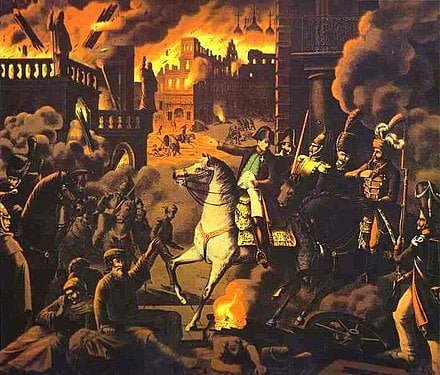
It was started on 14th September 1812, curiously the Fire of Moscow started just before Napoleon’s troops reached the city.
The 1812 Fire of Moscow broke out on 14 September 1812, when Russian troops and most of the remaining residents had abandoned the city of Moscow just ahead of the French Emperor Napoleon’s troops entering the city after the Battle of Borodino. The fire all but destroyed the city, which had been already been abandoned by its residents durig the previous month.
Before leaving Moscow, Count Rostopchin gave orders to have the Kremlin and major public buildings (including churches and monasteries) either blown up or set on fire.
His orders to burn Moscow destroyed supplies for the French and made surviving the harsh Russian winter impossible. In 1823, however, he did admit to the charges of arson for setting fire to the capital and was disgraced
But this was not the foremost cause of the fire that destroyed the city. As the bulk of the French army moved into the city, there were some fires. Their cause has never been determined there could have been other reasons such as neglect. According to Germaine de Staël, who left the city a few weeks before Napoleon arrived, it was Rostopchin who ordered to set his mansion on fire, which spread to the city with its 1,600 churches. However, the majority of historians now blame the initial fires on Russian sabotage.
One of Napoleon’s generals, Armand de Caulaincourt, says that after being in Moscow for three days a small fire broke out and was not extinguished and blamed on the carelessness of the troops. For several days fires seemed to keep, breaking out all over the city. In fact, some soldiers were arrested and claimed that their commanding officer had ordered them to burn everything.
It is also claimed that a Moscow police officer was captured trying to set the Kremlin on fire where Napoleon was staying at the time.
The fires quickly grew out of control growing into a massive blaze. The main reason for this is that most of houses were built of wood. The French soon realised that the fire brigade, had no equipment, it was not there, it had been removed!
There are differing versions of the cause of the fire, as Tolstoy, in his novel War and Peace, suggests that the fire was the natural result of placing a deserted and mostly wooden city in the hands of invading troops.
The Time Scale:
- September 8 – Russian army began retreating east from Borodino.
- September 12 – Russian army, followed by Joachim Murat’s vanguard, set camp at Fili; Russian vanguard lodged in Dorogomilovo.
- September 12 – Peak of civilian flight from Moscow.
- September 13 – Russian military council at Fili agreed to abandon Moscow without fighting.
- September 14 – Russian army marched through Moscow into an eastbound road to Ryazan, followed by masses of civilians (Tarle).
- French army crossed Moskva River in three columns in Fili, Dorogomilovo and Luzhniki, converging on the city center.
- Main body of La Grande Armée counted less than 90,000 men.
- Murat with some 25,000 troops was dispatched east to follow Russian retreat.
- His corps was the first to ride through the city, taking the Kremlin in the afternoon.
- Russian sources report first fires in abandoned city; French sources date first reports to Napoleon at dawn of the next day (Tarle).
- These early fires were localized at Kitai-gorod, Solyanka Street and Taganka (Katayev) and did not slow down the French invasion of the city.
- September 15 – Massive fire in Kitai-gorod. Napoleon arrived at Kremlin.
- September 16 – Firestorm threatens Kremlin. Napoleon relocated to suburban Petrovsky Palace, breaking through the burning Arbat Street to Moskva river, then taking a safe route north-west by the river bank.
- September 17/18 – Fire destroyed most of the city and settled down; Napoleon returned to Kremlin, expecting plea for peace from tsar Alexander I of Russia.
- September 24 – French court-martial executed 10 first “saboteurs” (Tarle).
- October 18/19 – French army left Moscow.
The Question?
Was it set off on the orders of Count Rostopchin, or even someone higher up.
What do you think?
Whatever the reason, it did have the effect of persuading Napoleon not to spend the winter in Moscow, which lead to his dreadful retreat through the winter which devistated his army and led to the end of his Empire.
Isn’t history Interesting?
10 questions to discuss:
- What were the primary reasons for the devastation of Moscow in the 1812 fire?
- Describe the events leading up to the 1812 fire in Moscow, including the military movements and decisions made by both Russian and French forces.
- How did Count Rostopchin contribute to the destruction of Moscow, according to historical accounts?
- What conflicting accounts exist regarding the cause of the initial fires in Moscow in 1812?
- How did the composition of Moscow’s buildings contribute to the rapid spread of the fire?
- Why did Napoleon ultimately decide not to spend the winter in Moscow after the fire?
- What role did Russian sabotage allegedly play in the ignition and spread of the fires?
- Describe the actions taken by Napoleon and his troops during their time in Moscow leading up to the fire.
- How did the absence of a functional fire brigade exacerbate the situation during the Moscow fire of 1812?
- What were the long-term consequences of the 1812 fire of Moscow for Napoleon and his army?
Some more sites of interest:
https://revolution.chnm.org/d/522
https://www.rbth.com/history/335275-who-burned-down-moscow-1812
https://www.history.com/this-day-in-history/napoleon-enters-moscow
© Tony Dalton

